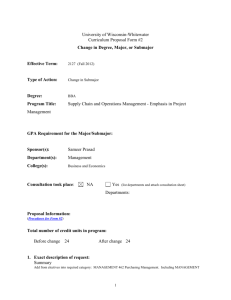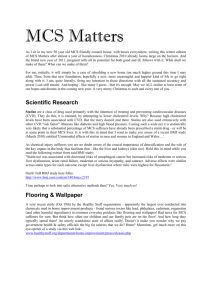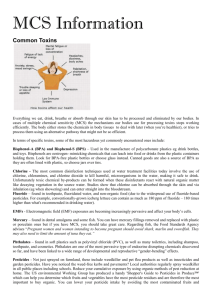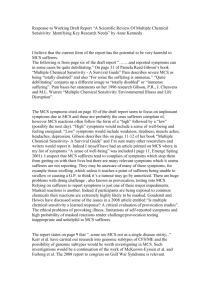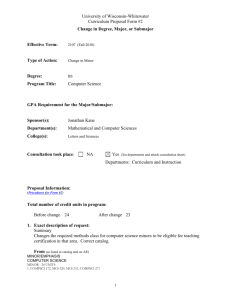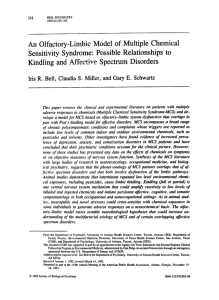Dear Physician: - Ohio Network for the Chemically Injured
advertisement
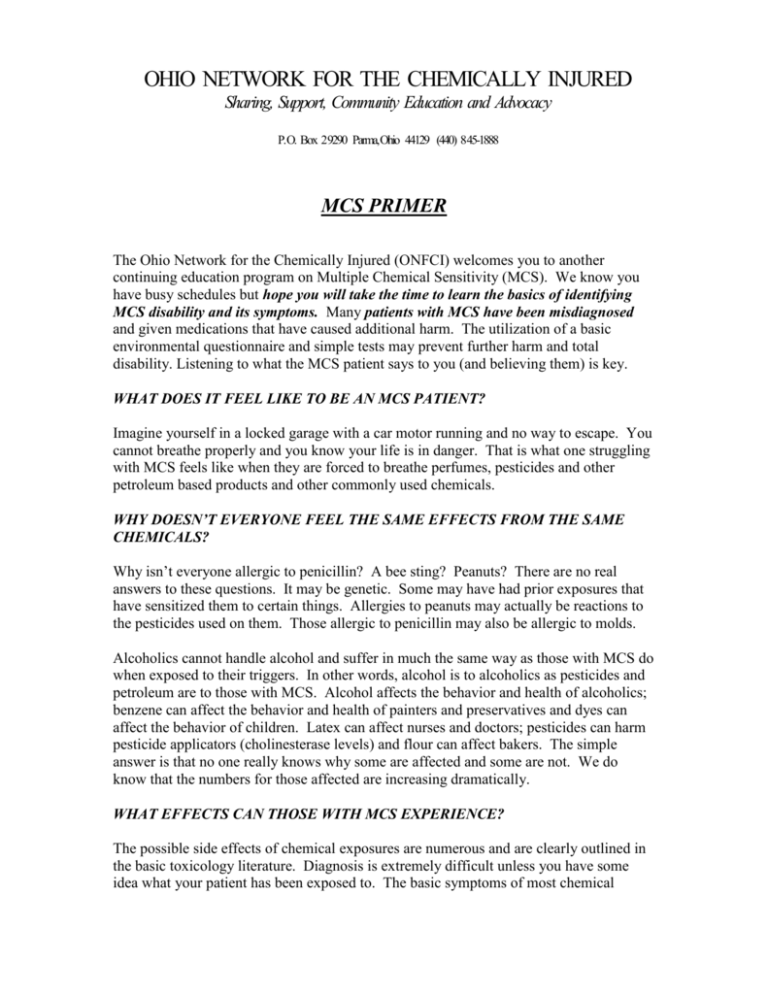
OHIO NETWORK FOR THE CHEMICALLY INJURED Sharing, Support, Community Education and Advocacy P.O. Box 29290 Parma,Ohio 44129 (440) 845-1888 MCS PRIMER The Ohio Network for the Chemically Injured (ONFCI) welcomes you to another continuing education program on Multiple Chemical Sensitivity (MCS). We know you have busy schedules but hope you will take the time to learn the basics of identifying MCS disability and its symptoms. Many patients with MCS have been misdiagnosed and given medications that have caused additional harm. The utilization of a basic environmental questionnaire and simple tests may prevent further harm and total disability. Listening to what the MCS patient says to you (and believing them) is key. WHAT DOES IT FEEL LIKE TO BE AN MCS PATIENT? Imagine yourself in a locked garage with a car motor running and no way to escape. You cannot breathe properly and you know your life is in danger. That is what one struggling with MCS feels like when they are forced to breathe perfumes, pesticides and other petroleum based products and other commonly used chemicals. WHY DOESN’T EVERYONE FEEL THE SAME EFFECTS FROM THE SAME CHEMICALS? Why isn’t everyone allergic to penicillin? A bee sting? Peanuts? There are no real answers to these questions. It may be genetic. Some may have had prior exposures that have sensitized them to certain things. Allergies to peanuts may actually be reactions to the pesticides used on them. Those allergic to penicillin may also be allergic to molds. Alcoholics cannot handle alcohol and suffer in much the same way as those with MCS do when exposed to their triggers. In other words, alcohol is to alcoholics as pesticides and petroleum are to those with MCS. Alcohol affects the behavior and health of alcoholics; benzene can affect the behavior and health of painters and preservatives and dyes can affect the behavior of children. Latex can affect nurses and doctors; pesticides can harm pesticide applicators (cholinesterase levels) and flour can affect bakers. The simple answer is that no one really knows why some are affected and some are not. We do know that the numbers for those affected are increasing dramatically. WHAT EFFECTS CAN THOSE WITH MCS EXPERIENCE? The possible side effects of chemical exposures are numerous and are clearly outlined in the basic toxicology literature. Diagnosis is extremely difficult unless you have some idea what your patient has been exposed to. The basic symptoms of most chemical exposures can be the same , (i.e., breathing difficulties, depression, headache, memory loss, metallic taste, nausea, heart palpitations, fatigue, diarrhea, nausea, dizziness, vomiting, etc.). Some symptoms do stand out from others however. The “benzene high” is a known term as are the effects of carbon monoxide poisoning. As our knowledge base and familiarity grow, a standard medical vernacular will become commonplace. THERE IS NO SCIENTIFIC PROOF THAT MCS EXISTS? There is ample scientific proof in the toxicology literature that chemicals can and do cause the symptoms those with MCS experience. The only controversy is with the dose. There is no scientific proof of a headache or a cold, yet no one denies them because there are too many people with the same unexplainable symptoms. The numbers of those with “allergies” to perfumes and chemical products has been growing at an alarming rate. The chemical industry is handling MCS in quite the same way as the tobacco industry has attempted to deal with smokers and second hand smoke - denial and political controversy. While this controversy rages, the toxic chemicals are still on the market and the many of your patients are suffering. Note that within just the past few years the following products once thought to be safe have been banned or their use severely limited because they have been found to harm health: Dursban and other pesticides; latex, mercury; certain plastics containing phthalates (baby pacifiers); polyvinyl chloride (PVC) – in I.V. tubing, etc.; CCA wood (copper, chromium, arsenic) used in children’s playground equipment, fences, wood decks, etc.). The Agency for Toxic Substances and Disease Registry (ATSDR) has organized an International Conference on Chemical Mixtures to be held September 10-12, 2002 in Atlanta. This conference will deal with the analysis of low dose chronic and high dose acute exposure studies and the qualitative and quantitative methods for health risk assessments of mixtures. Phone number…………. MY FELLOW PHYSICIANS DO NOT BELIEVE IN MCS AND IT IS DIFFICULT TO CONVINCE THEM. You are only responsible for yourself. WHAT IF I REFUSE TO ACCOMMODATE OR SEE AN MCS PATIENT The Americans with Disabilities Act (ADA) requires the accommodation of all people with disabilities. A disability is defined as any limitation that interferes with a major life activity. Most patients with MCS have severe difficulty breathing, thinking and working when exposed to chemicals. We can provide you with simple, low cost recommendations concerning how to meet your obligations under the ADA. I DON’T HAVE THE TIME IT TAKES TO DO ALL THIS We all make time for what is important to us. What if you or someone in your family developed MCS tomorrow? What help would be available to you? A WORD OR TWO ABOUT INSURANCE COVERAGE AND ENVIRONMENTAL CONTAMINATION? Not Covered! Even mold contamination is currently being excluded from insurance policies. IN CLOSING While there are no real answers, perfect tests or cures for this perplexing disability, patients with MCS need your help and support. As with AIDS, MCS is a condition that opens the door to a variety of debilitating and life threatening diseases such as: 1. Iron Deficiency Anemia 2. Pernicious and other anemia 3. Peripheral Neuropathy 4. Parkinson’s Disease 5. Cancer 6. Asthma and other breathing difficulties 7. Lupus 8. Depression 9. Heart problems 10. Clotting and vascular problems 11. Diabetes When one has MCS these illnesses are aggravated by further chemical exposures which can include pharmaceutical drugs and their additives. Based on our experiences, we strongly recommend that all MCS patients be checked for: 1. Iron deficiency anemia (with a ferritin iron level) – Copper and Zinc are heavy metals that compete with iron and may mimic it in a regular CBC blood test. 2. Check all potential MCS patients for Vitamin B12 deficiency. Any levels under 350 are especially suspect. The liver is the detoxification organ and should store large quantities of Vitamin B12. The following blood tests should be given together to determine B12 deficiency. If homocysteine, methylmalonic acid, or both, are high and return to normal after a few weeks of B12 treatment, it is likely the patient is malabsorbing and requires continued treatment. A deficiency may prevent eliminating toxic chemicals from the body. a. b. c. d. B12 Folate Homocysteine levels Methylmalonic acid Important Note: Many food products are now supplemented with folic acid and folic acid prevents megaloblastic anemia without preventing the damage done by B12 deficiency. Medical literature is available upon request concerning B12 deficiency. We are here to assist you in learning how to recognize and care for your patients disabled with MCS. Please let us know what we can do to help. Ohio Network for the Chemically Injured

